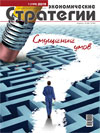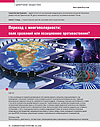Transition to Multipolarity: Battlefields or Positional Opposition?
The article analyzes the current transitional stage of development of the world community, when unipolarity under the leadership of the United States begins to weaken. Under these conditions, the resistance of the establishment of countries losing their dominance in the world community, the position of states defending the principles of multipolarity, in connection with which the conflict character of the development of the world community increases. The theory of the balance of forces inherent in the “cold war”, which considers balancing the nuclear potential of countries possessing it, now involves the inclusion of elements of information confrontation and cyber opposition, the latter can lead to radical negative consequences. The article analyzes the development of international law as a basic element of the formation of polycentrism, opposition to information attacks from the West, as well as the need to develop a single platform for the BRICS countries to digitize economies and information and communication interaction.
References:
- Iokhannesburgskaya deklaratsiya Desyatogo sammita BRIKS. Iokhannesburg, YuAR, 26 iyulya 2018 g., p. 16 [Johannesburg Declaration of the Tenth BRICS Summit. Johannesburg, South Africa, July 26, 2018, p. 16]. Komitet Gosudarstvennoi dumy po mezhdunarodnym delam, available at: http://interkomitet.ru/blog/2018/07/26/johannesburgskaya-deklaratsiya-desyatogo-sammita-briks/
- Istochniki mezhdunarodnogo prava [International Law Sources]. Cribs.me, available at: https://cribs.me/mezhdunarodnoe-pravo/istochnikimezhdunarodnogo-prava.
- Piccone T. Why international law serves U.S. national interests. Brookings. 2017, April, 12, available at: https://www.brookings.edu/research/why-internationallaw-serves-u-s-national-interests/
- Cover M. GOP Senators Sink Law of the Sea Treaty; ‘This Threat to Sovereignty’. CNSNews.com, available at: https://www.cnsnews.com/news/article/gop-senators-sink-law-sea-treaty-threat-sovereignty.
- Wright T. The Return to Great-Power Rivalry Was Inevitable. The Atlantic. 2018. September, 12, available at: https://www.theatlantic.com/international/archive/2018/09/liberal-international-order-free-world-trump-authoritarianism/569881/?utm_campaign=…4/14.
- Aguiar Patriota A., de. Is the World Ready for Cooperative Multipolarity. Rising Powers and Global Governance, 2017, May, available at: http://risingpowersproject.com/quarterly/world-ready-cooperative-multipolarity/
- Gartzke E. Power Shuffle: Will the Coming Transition Be Peaceful? Current history, available at: http://www.currenthistory.com/Article.php?ID=723.
- Chinese students in US fear backlash after Vice-President Mike Pence’s inflammatory speech. South China Morning Post, 2018, October, 6, available at: https://www.scmp.com/news/china/diplomacy/article/2167290/chinese-students-us-fear-backlash-after-vice-president-mike.
- Hawkins Derek. The Cybersecurity 202: Trump’s meeting with Putin a pivotal moment for effort to deter Russian cyberattacks. The Washington Post, 2018, July, 16, available at: https://www.washingtonpost.com/news/powerpost/paloma/the-cybersecurity-202/2018/07/16/the-cybersecurity-202-trump-s-meetingwith-putin-a-pivotal-moment-for-effort-to-deter-russian-cyberattacks/5b4b52791b326b1e646953bb/?noredirect=on&utm_term=.3bd1df6d0549.
- Russia. GALLUP, available at: https://news.gallup.com/poll/1642/russia.aspx.
- Do the foreign state influence the US Presidential elections? Softpanorama, available at: http://www.softpanorama.org/Skeptics/Political_skeptic/Two_party_system_as_poliarchy/Foreigh_influence_on_elections/index.shtml.
- Coats D.R. Worldwide Threat Assessment of the US Intelligence Community. Director of National Intelligence, 2018, February, 13, pp. 5–6.
- Cyber Conflict and Geopolitics — the Cold War’s New Front. Borysfen Intel, 2018, September, 5, available at: http://bintel.com.ua/en/article/09_05_krynica.
- Pazyan A. Cyberspace — Human the Domain for Wars. Noravank Foundation, available at: http://www.noravank.am/eng/articles/detail.php/?ELEMENT_ID=16349.
- Reed Ch. Cyberwar and the world; Hacking can reduce violence in the real world. Foreign affairs, 2015, November, pp. 77–79.
- Cyber Security and Cyber Crime: A Comparative Study in a New “Cold War” Scenario. Eunomia. Rivista semestrale di Storia e Politica Internazionali Eunomia VII n.s., 2018, no 1, pp. 157–178. e-ISSN 2280-8949, DOI 10.128.



